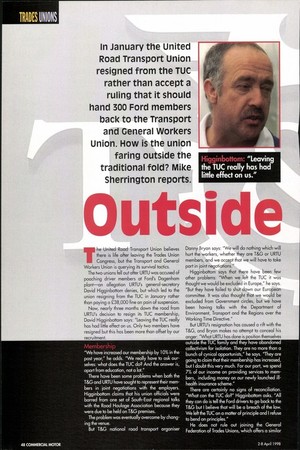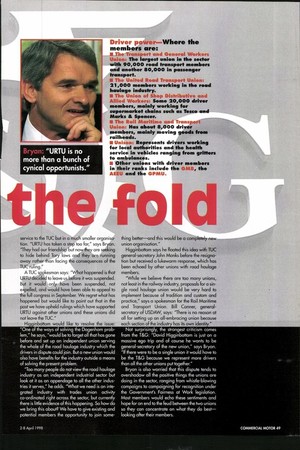Outs de 1 In January the United Road Transport Union
Page 50

Page 51

If you've noticed an error in this article please click here to report it so we can fix it.
resigned from the TUC rather than accept a ruling that it should hand 300 Ford members back to the Transport and General Workers Union. How is the union faring outside the traditional fold? Mike Sherrington reports. Driver Where the members are: • The The largest union in the sector with 90,000 road transport members and another 80,000 in passenger transport.
United Road TruL 21,000 members working in the road haulage industry.
h Union of Allied WorkerSome 20,000 driver members mainly working for supermarket chains such as Tesco and Marks & Spencer.
Tran Has about 8,000 driver members, mainly moving goods from railheads.
• Ul. Represents drivers working for local authorities and the health service in vehicles ranging from gritters to ambulances.
• Other unions with driver members in their ranks include the , the AU and the ";PMU.
he United Road Transport Union believes there is life after leaving the Trades Union Congress, but the Transport and General Workers Union is querying its survival tactics.
The two unions fell out after URTU was accused of poaching driver members at Ford's Dagenham plant—an allegation URTU's general-secretary David Higginbottom denies, but which led to the union resigning from the TUC in January rather than paying a 238,000 fine on pain of suspension.
Now, nearly three months down the road from URTU's decision to resign its TUC membership, David Higginbottom says: "Leaving the TUC really has had little effect on us. Only two members have resigned but this has been more than offset by our recruitment.
'We have increased our membership by 10% in the past year," he adds. "We really have to ask ourselves: what does the TUC do? And the answer is, apart from education, not a lot."
There have been some problems when both the T&G and URTU have sought to represent their members in joint negotiations with the employers. Higginbottom claims that his union officials were barred from one set of South-East regional talks with the Road Haulage Association because they were due to be held on T&G premises.
The problem was eventually overcome by changing the venue.
But T&G national road transport organiser Danny Bryan says: "We will do nothing which will hurt the workers, whether they are T&G or URTU members, and we accept that we will have to take part in joint negotiations."
Higginbottom says that there have been few other problems: "When we left the TUC it was thought we would be excluded in Europe," he says. "But they have failed to shut down our European committee. It was also thought that we would be excluded from Government circles, but we have been having talks with the Department of Environment, Transport and the Regions over the Working Time Directive."
But URTU's resignation has caused a rift with the T&G, and Bryan makes no attempt to conceal his anger: "What URTU has done is position themselves outsi•e t e TUC ami y an. they ave a .an•one. collectivism for isolation. They are no more than a bunch of cynical opportunists," he says. "They are going to claim that their membership has increased, but I doubt this very much. For our part, we spend 7% of our income on providing services to members, including money on our newly launched illhealth insurance scheme."
There are certainly no signs of reconciliation. "What can the TUC do?" Higginbottom asks. "All they can do is tell the Ford drivers to go back to the T&G but I believe that will be a breach of the law. We left the TUC on a molter of principle and I refuse to bend on principles."
He does not rule out joining the General Federation of Trades Unions, which offers a similar service to the TUC but in a much smaller organisation. "URTU has taken a step too far," says Bryan. "They had our friendship but now they are seeking to hide behind Tory laws and they are running away rather than facing the consequences of the TUC ruling."
A TUC spokesman says: "What happened is that URTU decided to leave us before it was suspended. But it would only have been suspended, not expelled, and would have been able to appeal to the full congress in September. We regret what has happened but would like to point out that in the past we have upheld rulings which have supported URTU against other unions and these unions did not leave the TUC."
Higginbottom would like to resolve the issue: "One of the ways of solving the Dagenham problem," he says, "would be to forget all that has gone before and set up an independent union serving the whole of the road haulage industry which the drivers in dispute could join. But a new union would also have benefits for the industry outside a means of solving the present problem.
"Too many people do not view the road haulage industry as an independent industrial sector but look at it as an appendage to all the other industries it serves," he adds. "What we need is an integrated industry with trades union activity co-ordinated right across the sector, but currently there is little evidence of this happening. So how do we bring this about? We have to give existing and potential members the opportunity to join some thing better—and this would be a completely new union organisation."
Higginbottom says he floated this idea with TUC general-secretary John Monks before the resignation but received a lukewarm response, which has been echoed by other unions with road haulage members.
"While we believe there are too many unions, not least in the railway industry, proposals for a single road haulage union would be very hard to implement because of tradition and custom and practice," says a spokesman for the Rail Maritime and Transport Union. Bill Conner, generalsecretary of USDAW, says: "There is no reason at all for setting up an all-embracing union because each section of the industry has its own identity."
Not surprisingly, the strongest criticism comes from the T&G: "David Higginbottom is just on a massive ego trip and of course he wants to be general-secretary of the new union," says Bryan. "If there were to be a single union it would have to be the T&G because we represent more drivers than all the other unions put together."
Bryan is also worried that this dispute tends to overshadow all the positive things the unions are doing in the sector, ranging from whistle-blowing campaigns to campaigning for recognition under the Government's Fairness at Work legislation. Most members would echo these sentiments and hope for an end to the feud between the two unions so they can concentrate on what they do best— looking after their members.
























































































































